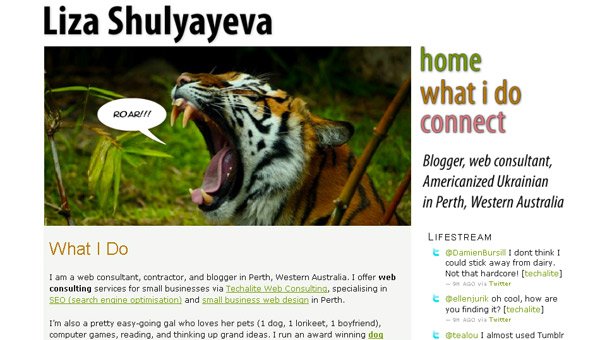Blogging for Job Seekers And How to Own your Online Identity with an Online CV

In this post I’d like to talk about blogging and building a strong, positive online identity for job seekers. I want to cover not only blogging itself, but also making the Internet work for you by building your own personal online CV website.
Gone are the days when job seekers were able to produce a kickass paper resume or CV and leave it at that. Employers are Googling people now. They’re doing their research online, which is one of the most open and revealing mediums today. Blogging can help you show employers exactly what you want them to see – not some random comment you made on a forum a few years ago that could unknowingly cost you a potential employer’s respect and therefore a job offer.
Instead of having a potential employer Google your name and stumble across whatever random stuff you’ve been up to online, why not lead them to the information you want them to find? Promote your blog, promote your social media profiles, list them in your paper CV – and show people what you want them to see. Show people the best side of you, the side that makes them say “I want to hire this person“.
One of the first things I recommend to job seekers when they ask me what they can do to make the Internet work for them is building an online CV.
Who should have an online CV?

Anyone and everyone. I have an online CV even though I’m not in the market for a full time job. This article is targeted mostly to traditional job seekers, but can work for anybody. Your freelance clients and even recruitment agencies can Google you, too. A great online CV can be the tipping point for whether or not you get that new contract.
When creating an online CV
Here are some points you should keep in mind when creating your online CV, starting with your on-site blog and followed by some other things of note:
Create a blog on your online CV site
Your blog will likely be the strongest tool in promoting your online CV and your personal brand to potential employers. When an employer sees your blog, they see a part of you and get a feel for your personality. Make your blog personal enough to make them feel like they’re seeing more into who you are as a person than what a regular paper CV or resume would show. Write blog posts about topics related to your work and the job(s) you’re applying for, but also feel free to write about more personal day-to-day events (I just wrote about attending a Slovakian ballet performance with a friend on my own personal blog). In addition, posting regular updates about what you’ve been up to or articles about your industry on your personal blog will show the potential employer that you’re active and that they are seeing the current version of you, not an outdated version from a year ago.
 Despite making your personality visible in your blog, consider the industry you are in and how “corporate” your job is. Be personal, but tasteful. Remember – you have to show employers the good, attractive side of you – not the creepy “I just went to the toilet – look, I took a photo” side.
Despite making your personality visible in your blog, consider the industry you are in and how “corporate” your job is. Be personal, but tasteful. Remember – you have to show employers the good, attractive side of you – not the creepy “I just went to the toilet – look, I took a photo” side.
Title of your website
Name the website in your own name. You want your CV to appear in the first search results when someone Googles your name. If you’re like me and have an unsual name that not many other people share, that’s great. It also means that if anyone searches for your name all they will find is you – the good and the bad – which makes putting your best foot forward in an online CV all the more important.
If you have a very common name, consider using the most unique version. For example, “Christopher” tends to be used less often than the shortened “Chris” online. Remember that whatever name you go with in your online CV also needs to be the name you list in your paper CV.
Your domain name
I recommend using your full name (www.johnsmith.com) or at least your name in part when it comes to registering a domain name for your online CV. I decided that my own last name is far too long and complicated (can you go to Google tomorrow and spell “Shulyayeva” off by heart without cheating? Not very memorable). So I went with my first name – liza.id.au. The domain name is short and memorable, but I still use my full name on the actual website.
State your role clearly
State what you do in the header of the site, have an About page that is a brief synopsis of who you are (or even a cover letter of sorts). Most of us aren’t a master of just one trade. For example, I work in IT – web solutions, specifically. I do everything from SEO to web design to WordPress training and online resume/CV design.
If you have a lot to say on different aspects of what you do, you can separate your “job descriptions” into different sub-pages. On my own personal website I briefly list what I do on one page and lead people to my Techalite site if they want to read about individual services.
Make your contact details available
If you don’t feel like revealing a phone number or address online, just provide your email and general location. Make yourself reachable.
Link to social media profiles
Link to social media profiles that you want potential employers to see, such as LinkedIn, perhaps Twitter, and anything else you wouldn’t mind a professional contact viewing.
Make a PDF version of your paper CV available for download
Convert your paper CV into PDF format and allow viewers to download it. This will serve as a printable version of your CV and also leave no doubt in a potential employer’s mind that you are the same person whose CV is on the desk in front of them.
The design of your online CV
Your online CV design does not need to be as plain as your paper CV might be. Paper can be a limited medium. Not to mention you don’t want to be too creative with your paper CV as employers probably just want to glance through your details and move on to the next applicant. Online not only are your design options much more flexible, but if a potential employer has gone to the effort of actually Googling your name they are interested in taking a deeper look into who you are. They’re already invested in terms of time – now you can sell yourself in whatever creative ways you want.
I wanted my own online CV site to be simple, yet quirky. Here’s a screenshot of what I came up with:

I’m currently designing an online CV for a client and, being an engineering student, he wanted his CV to have more of a “corporate” feel to it. Your CV can send any kind of message you think is appropriate from a design standpoint.
In conclusion…
Own your online identity. An online CV with a blog can show employers more of who you are and ensure that they are seeing what you want them to see when they research you online.
 FreelanceMyWay Review – A New Marketplace for Freelancers and Clients
FreelanceMyWay Review – A New Marketplace for Freelancers and Clients 5 Blogging Limiting Beliefs about Money that You Need to Release
5 Blogging Limiting Beliefs about Money that You Need to Release What’s Up Bloggers! Roundup #8 with Don Sturgill
What’s Up Bloggers! Roundup #8 with Don Sturgill What is Keeping Your Blog from Making Money?
What is Keeping Your Blog from Making Money?
{ 19 Responses }